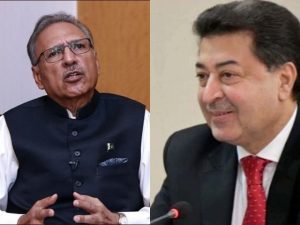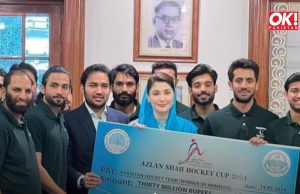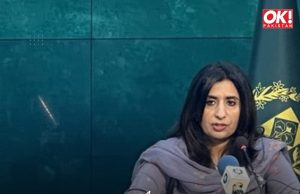ISLAMABAD: President Arif Alvi has jumped into the election discussion by calling Chief Election Commissioner Sikandar Sultan Raja to meet on Wednesday to discuss setting the poll date within the constitutional deadline of 90 days, which ends in early November.

In addition, the Election Commission of Pakistan (ECP) extended invitations to major political parties for pre-election discussions.
Critics of the commission’s use of delimitation “as an excuse for delaying the nationwide exercise” included political figures, lawyer organizations, and members of civil society.
The PDM government announced the Digital Census 2023 days before dissolving the National Assembly, and the ECP established a schedule to carry out delimitation in accordance with that census earlier this month.
Over a month after the first deadline of 90 days for holding general elections, on December 14 the process of fresh delimitation of the national and the four provincial assembly constituencies will be finished.
In a letter detailing the constitutional provision on the 90-day limit, President Arif Alvi wrote, “The chief election commissioner is invited for a meeting with the president today or tomorrow to fix an appropriate date.”
The president is required by Article 48(5) of the Constitution to declare the date of the next presidential election, so he called a meeting of the CEC for advice.
On August 9, on the advise of then-Prime Minister Shehbaz Sharif, the president dissolved the National Assembly. However, the ECP had indicated before the elections that the constituencies will be redrawn in light of the digital census.
According to Article 48 (5) of the Islamic Republic of Pakistan’s constitution, “the president is obliged to appoint a date not later than 90 days from the date of dissolution for the holding of the general election of assembly,” the president remarked.
With the above in mind, I am writing to invite the chief election commissioner to meet with me either today (Wednesday) or tomorrow (Thursday) to discuss scheduling a meeting.
While the president has pointed to constitutional clauses clarifying his role in setting election dates, a recent modification to the Elections Act 2017 gave the ECP the authority to set election dates independently, without informing or consulting the president.
The ECP’s decision to cancel elections for this year following the notification of the most recent digital census provides context for the president’s invitation to the CEC.
Since the NA was dissolved three days before the end of its constitutional term, elections must be held within 90 days of the NA’s dissolution per Article 224 of the Constitution.
The Elections Act provides, however, that “the commission shall delimit constituencies after every census is officially published” (Section 17(2)).
The CEC already had settled on the new constituencies before the president’s letter arrived. After new districts are drawn, experts say a general election might be held as early as February.
A new constitutional dispute was predicted to be sparked by the president’s letter, according to their analysis. According to the ECP’s sources, the CEC will soon react to the president’s letter.
The ECP, on the other hand, consulted with political parties about general election preparations and the problem of constituency demarcation.
Parliamentarians from the Pakistan Peoples Party (PPPP), the Pakistan Muslim League-Nawaz (PML-N), Jamiat Ulema-e-Islam (Fazl), and the Pakistan Tehreek-e-Insaf (PTI) were all extended invitations to the ECP’s first meeting.
This Thursday (today) would be the first in a string of scheduled gatherings. The meeting agenda, according to officials, was also included in the invitation. It also allowed for the representatives of party leaders to attend.
President Asif Zardari of the PPP, President Shehbaz Sharif of the PML-N, Maulana Fazlur Rehman of the JUI-F, and Chairman Imran Khan of the PTI have all been invited.
The ECP, according to the authorities, would confer with the parties during the consultations in order to get their input on the redrawing of seats, the updating of electoral records, the changes to the election schedule, and the implementation of transparency measures.
On Thursday (today), the PTI and the JUI-F were invited by the ECP. On Friday (tomorrow), August 29th, the PML-N has been invited to a meeting in the morning, and the PPP in the afternoon.
Marriyum Aurangzeb, a spokesperson for the PML-N, said that the party had received the ECP invitation and that a seven-member team would meet with the elections supervisor.
The PML-N delegation will include Attaullah Tarar, Engineer Amir Maqam, and Khawaja Saad Rafique, as well as PML-N Secretary General Ahsan Iqbal, Senator Azam Nazir Tarar, Zahid Hamid, Rana Sanaullah, Khawaja Saad Rafique, and Engineer Amir Maqam.
The JUI-F has sent Senator Kamran Murtaza and Maulana Abdul Ghafoor Haideri to speak with the CEC. In Saudi Arabia for Umrah is JUI-F chairman Maulana Fazlur Rehman.
The PTI appointed a three-person panel to confer with the CEC. The PTI will be represented by Senator Ali Zafar, Lawyer Gohar Khan, and Umair Niazi.
The three attorneys’ candidacy was accepted by the PTI secretary general.
And sources within the ECP say that Chief Electoral Commissioner Raja called a meeting of the ECP for this Thursday (today) to discuss President Alvi’s letter establishing the election date.




















































